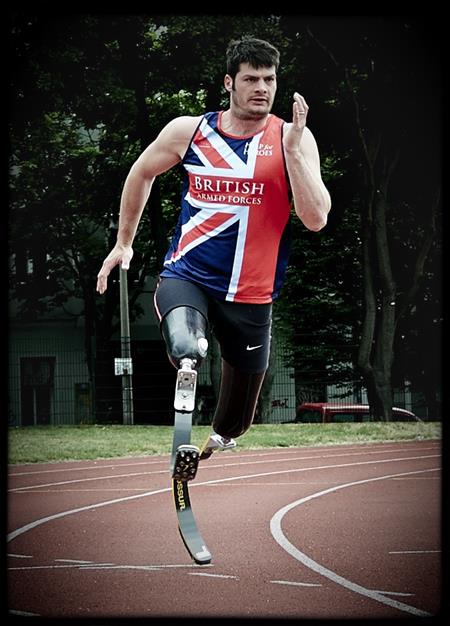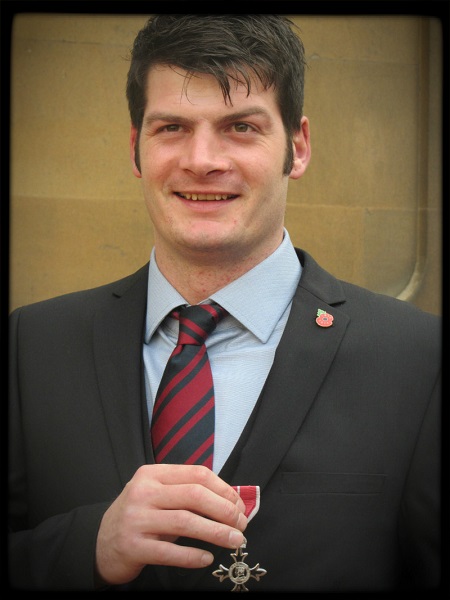Institution news
Dave Henson MBE, AMIMechE was always keen to pursue a military career. He achieved a first class degree in mechanical engineering from the University of Hertfordshire, which included a year out in the Army and a dissertation on access mechanisms and benefits of sport for wounded veterans. He started his military career with a year of intense infantry and leadership training at the Royal Military Academy, Sandhurst. Upon commissioning, Dave joined the Corps of Royal Engineers, and was deployed to Afghanistan as a Royal Engineer Search Advisor in 2010, responsible for the co-ordination, planning and conduct of Improvised Explosive Device (IED) Search Operations.
In February 2011 Dave stood on an IED and lost both legs at the knee. He spent five weeks at the Royal Centre for Defence Medicine, a very highly skilled military medical unit at the Queen Elizabeth Hospital, Birmingham. Here Dave was put back together piece by piece, as best modern medicine allows, before being sent to the Defence Medical Rehabilitation Centre, Headley Court. Dave was up and walking at half height just 8 weeks after losing his legs, and was back to full height at 14 weeks. He explains: “The military has, unfortunately, had a lot of experience over the last few years of dealing with this kind of injury, and it has learned what works best.” After 10 months Dave had his first pair of running blades, and a new passion.
Sport is an important element of military training; with benefits such as teamwork, targets, disciplines, as well as physical fitness. Its impact on injured and recovering soldiers is powerful and profound. He started with swimming, then rapidly moved on to volleyball and running.

“Sport in a rehabilitation setting adds an important element of familiarity in a situation where everything else is anything but. By utilising the galvanising effects of sport, such as competitiveness, desire for improvement, being part of a team – the physical and psychological recovery benefits can take place without much conscious thought.”
Dave went back to work part time in one of the Army’s Personnel Recovery Units, where he helped the long term sick or wounded, before being medically discharged in March 2014. He is also an advisor to the Royal British Legion Centre for Blast Studies at Imperial College London, who are concerned with the mitigation and prevention of blast injuries, as well as improving post-blast medical treatment.
Dave started a Masters in Biomedical Engineering at Imperial College London, because he wanted to improve the design of prosthetic limbs and the feasibility of using knee implants. “The current prosthetic legs are quite good, but I often feel disabled when I have to go up stairs, climb hills or simply stand from a chair - I need more power and better control over my joints. I would like to see prosthetics improved and the gap between the capabilities of biological and prosthetic limbs minimised. By having optimised and individualised prosthetics I think we can improve them further.”
Using himself as a case study, he investigated how to help amputees regain some of the function lost with the loss of the knee joint. He concluded that an analysis tool was required to take this work further, which he is now developing as his PhD. He would like to see the muscles and tendons in his upper leg used to improve the functionality of the prosthetic, and is using computational analysis to do this. Combining classical mechanics – force, speed and time – with gait analysis he can create a digital model of an amputee. He can then make changes, from things such as targeted improvements in physical fitness through to surgical implants and bespoke prosthetics, and understand the impact that they will have. This stepwise analysis leads to a design brief for an engineer to produce a tailored surgical implant or prosthetic that will have been optimised for the person.

Dave’s passion for sport and the role it plays in rehabilitation came together when he was the Captain of the British Armed Forces Team in the 2013 Warrior Games, and on into the inaugural 2014 Invictus Games. Dave initially fulfilled a role as ‘sounding board’, providing advice from the point-of-view of an injured soldier and, following the public launch of the Invictus Games in March 2014, Dave was asked to be the Captain of the British Armed Forces Team.
He describes what it means to him: “The Invictus Games feels very much a personal project, and I was involved both as a competitor and behind the scenes. The Military is an extended family and this sporting competition is part of that. It is emotional and enjoyable to see success after often tragic circumstances. Athletes are able to demonstrate their fighting spirit.”
Dave has just won a gold medal at the Florida Invictus Games in May, and is hoping to be selected for the Paralympics in Rio later this year. He is spending two days a week on his PhD and five days as a full time track athlete. “The two work well together. What I am learning from my training feeds into my PhD. Understanding the impact of developing muscles and improving fitness gives useful information to understanding how to close the gap between prosthetics and real legs.
Find out about the Institution's Biomedical Engineering Association (BmEA).